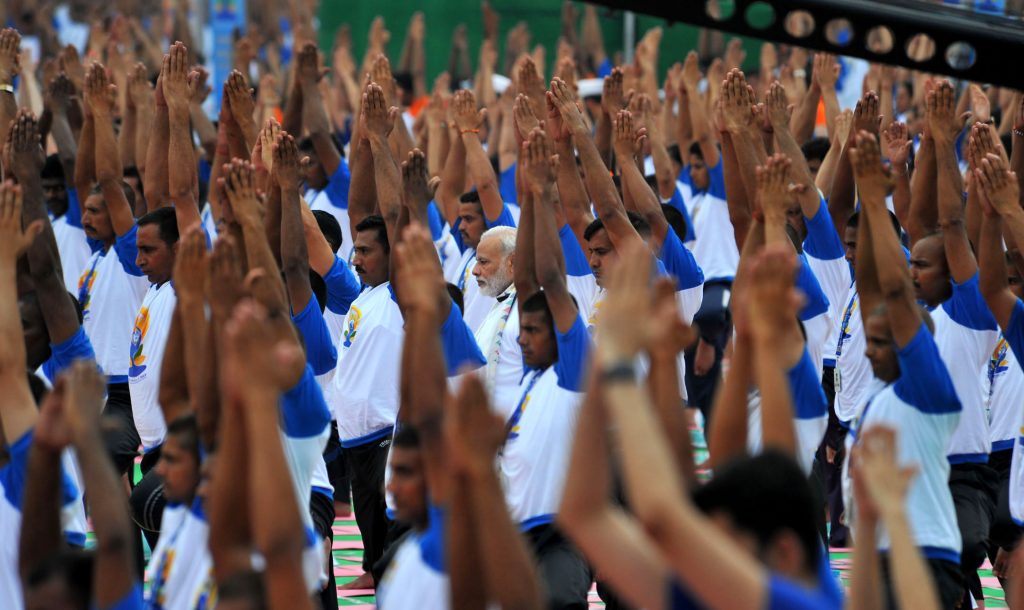Especially since the election of Narendra Modi as India’s prime minister in 2014, yoga has been enjoying particular pride of place as an emblem for India in a globalising world. As yoga has moved into the mainstream of many societies, gaining ground in places like Australia, the United States and China, it has helped India present itself as a country with the answer to many modern ills. In a world where non-communicable disease and stress wreak more and more havoc, yoga promises a world of holistic health, human flourishing, and hypermodernity with an indigenous twist.
Yet yoga is not all light, peace, and weight loss. Traditions of yogis in folklore, as the scholar David Gordon White has shown, reveal the yogi in Indian storytelling as a distinctly sinister figure. This fascination takes on new significance today in Indian popular fiction as a window into the broader anxieties of post-liberalisation India.
In emerging Indian novels, writers portray yoga as a space of supernatural prowess and even black magic to confront key issues of gender, caste, corruption and violence in today’s world. In these novels, yoga may well offer spiritual peace to some, but the practice is also fundamentally linked to contests over power not dissimilar from the ones being fought through today’s upcoming elections.
Prominent yogis occupy a world of political networking and infighting for power in the contemporary Indian political landscape. Swami Ramdev, the wildly successful yoga entrepreneur who has built a business empire featuring Indian lifestyle and Ayurvedic wellness products, has often been seen as a voice for soft Hindu nationalism and for Prime Minister Narendra Modi. The rise of Ramdev has been thought to reflect his tight political relationship with the Bharatiya Janata Party, which has facilitated changes to India’s tax code and enabled land deals that have advantaged his spiritual empire. In 2019, for example, the BJP-led government in Himachal Pradesh evicted landless apple-growers to lease land at low cost to Ramdev’s Patanjali corporation. Ramdev is also a powerful voice with increasing institutional authority over Indian cultural norms. Via his Patanjali Yogpeeth Trust, Ramdev is now poised to oversee the standardisation of Vedic education for the government. Ramdev has been portrayed as a figure with king-maker qualities whose mass public appeal legitimates politicians in the eyes of prospective voters. Yoga and power are not so far apart.
At the same time, such political alliances are far from peaceful. The current moment marks battles between powerful yogis in corporate and political power, such as the tension between Ramdev and Yogi Adityanath, the chief minister of Uttar Pradesh. In late 2018, Ramdev refrained from throwing his weight behind Modi’s re-election campaign as he had done in 2014, instead demurring that he was stepping away from politics. This reticence has led to speculation about his ulterior motives, including the possibility of his own political run. While it is unlikely that Ramdev will soon jump into the current electoral fray, it is possible that such recusals mark broader ambitions.
In a world where yogic authority can be so closely tied to bids for power, Indian writers have developed new genres of speculative spiritual fiction that investigate the importance of such intimacy. Fantasy that riffs on religious and spiritual discourses is booming in contemporary Indian fiction in English. From self-published oddities to mass-market bestsellers, writers are exploring the politics of Indian spiritual practice with new intensity. In particular, writers have turned their attention to Tantra as a generative space for understanding contemporary contradictions.
In Western contexts, “Tantra” has become virtually synonymous with “sex.” Western popularisers in the twentieth century marketed Tantra as a practice fundamentally concerned with secret ritual intercourse. Over time Tantra has offered a justification for sexual exploration in the name of higher spiritual seeking.
In India, however, “Tantra” also claims a strong association with magic, especially black magic. Tantrism is often seen as a world of enchanted objects, ritual sacrifices, and murderous spells. As Christophe Jaffrelot writes, Indian politicians have long defied India’s ostensibly secular identity to seek the aid of powerful tantriks. Indira Gandhi relied on Dhirendra Brahmachari to protect her from rivals, while in 2015, the chief minister of Bihar made headlines for a video shot of his meeting with a tantrik. While once politicians sought to conceal their reliance on tantriks, Jaffrelot argues, today they are much less apologetic. Tantrism is seen as a fearful esoteric universe with access to mystical channels that can influence worldly politics.
Both of these popular associations—sex and power—inform the twenty-first-century vision of Tantra in the speculative fiction of the Bengaluru-based writer Shweta Taneja. Yoga, in these novels, is not exactly the low-cost health technology of Modi’s public dreams, nor the aspirational lifestyle pursuit of India’s growing middle class. Instead, this is a world where yogis and yoginis wield supernatural powers and fight through mantras.
Such portraits draw upon the longstanding concept of yogic siddhis, or supernatural powers, that find articulation in a range of different philosophical texts. In some yogic traditions, siddhis were simply seen as by-products achieved along the way to greater philosophical insight into the nature of the universe. In other traditions, siddhis were the point. Being able to read someone’s mind, to fly, or to steal someone’s body supported broader quests for immortality and invulnerability. The world of Taneja’s novel offers an occult realm where competition for these powers is fierce.
But Taneja’s novels do not simply reflect an Indian political landscape that simmers with the desire for dark power. They also critique the exploitative grounds on which particular kinds of yogic authority exist. Taneja’s Anantya Tantrist urban fantasy series, with three volumes published in the past decade, turns our attention to a female tantrik in a male-dominated world to offer feminist critiques of political hierarchy and gender-based violence.
In The Rakta Queen (2018), the heroine, Anantya, is summoned by the head of the Association of tantriks to solve a mystery that may affect an upcoming convention between humans and tantriks, Tantri-Con. “It was a collaborative effort between the Association and the human government to make tantrism more mainstream,” Anantya declares. “The Indian government had promoted the event as an indigenous science project, complete with advertisements and permission from the Green Tribunal to use the flood plains near the Yamuna for the convention. There was a series of tantrik duels planned to celebrate the power of tantriks and the magic science. The prime minister and some ministers from the cabinet were also going to attend the final night” (The Rakta Queen, 47). The convention riffs on initiatives that have characterised Modi’s tenure as prime minister, which have placed new weight on practices seen to be part of India’s indigenous (often implicitly understood as pre-Islamic) cultural past.
Anantya’s job—among many—involves preventing a hostile black magic takeover of Tantri-Con and saving the life of the Indian prime minister. In doing so, she preserves the possibility of an alliance between the world of human politics and the supernatural forces controlled by the tantriks – an alliance that many real-life Indian politicians appear to take for granted.
Yet Anantya is also a strong critic of tantrism as a system that relies on the fundamental exploitation of female energies. The novel portrays maithuna, the ritual sex with which Tantra is often equated, as a highly instrumental practice designed to harvest female power for male purposes. Male tantriks in the novel need shakti, or female energy, to power their rituals, and they can obtain it through blood or sex.
This gendered exploitation invites satire on the cultural contradictions that inform the Indian government’s approach to Tantri-Con. When a well-meaning girl at the information desk declares that
“‘We offer vegetarian tantriks who can – ’”, Anantya cuts her off.
“‘Vegetarian tantriks? What in Bali’s name does that mean?’
She looked at me, her doll-like eyes wide. ‘White tantriks who perform pure rituals, pure vegetarian rituals, ma’am. No violence. That’s the only kind [the Central Association of Tantriks] approves.’
‘Are you serious?’
She frowned.
‘For horned-rhinos’ sake! White tantriks use your, your vagina, to power up their rituals. How kinder is that than any other kind of tantrism?’” (The Rakta Queen, 54).
Given the politics of vegetarianism under Modi’s tenure, with its controversial beef bans, Taneja’s novel invites its readers to consider the contradictory ideas around what constitutes “no violence” in contemporary India. In the novel, these indigenous sciences rely on the forcible extraction of a resource from bodies who have little structural power: babies, animals and women. Tantriks, traditionally, are men: Anantya is unusual in being her own female tantrik. The extraction of shakti from female bodies looks very much like the colonial extraction of India’s resources for Western might. In a world where the quest for energy—mundane and cosmic—is a quest for power, the Anantya Tantrist novels use the tools of speculative fiction to invite feminist critique of contemporary India.
Performing pluralism: why the BJP wants Muslim friends
In our guest series on South Asia, a look at how the BJP tries to detoxify its Hindu nationalist image with calculated appeals to select Muslim groups.
While economic growth in post-liberalisation India has moved millions out of poverty, the rise of capitalism has also engendered new anxieties about inequality and control. As more and more public goods are given over to private entities—whether this be the Adani group gaining contracts to run Indian airports or the Patanjali Yogpeeth Trust acquiring control to shape ideas of Vedic education—these privatised systems can work to benefit particular social groups over others. The allegorical world of Taneja’s speculative fiction testifies to ongoing anxieties about the power of the marketplace and its ability to reinforce social hierarchies.
Unlike many of the idealised guru autobiographies that dominated imaginative representations of yoga in India’s English traditions in the twentieth century, newer and edgier fictions like Taneja’s show a different awareness of the politics of spirituality. Although today’s modern postural yoga often presents itself as an escape from the chaos of politics, the two worlds have never been entirely separate in India. Contemporary fiction shows us the ongoing vitality of yoga’s other side: a world of supernatural forces where power over others, rather than liberation or wellbeing, may be the dominant prize.
 Facebook
Facebook  Twitter
Twitter  Soundcloud
Soundcloud  Youtube
Youtube  Rss
Rss 



